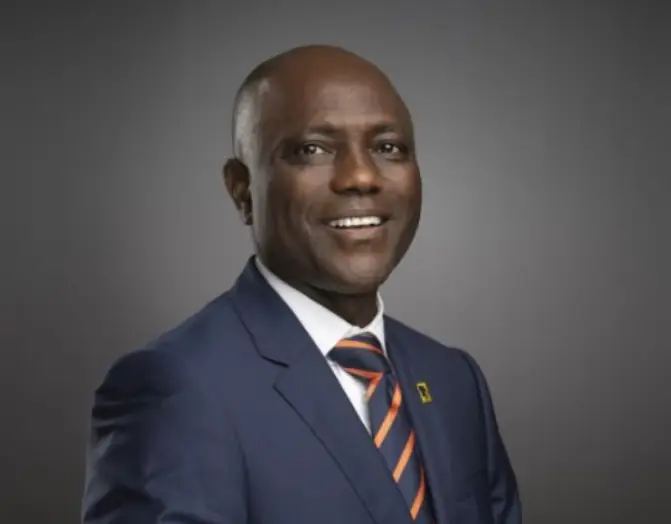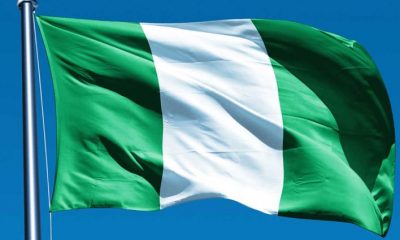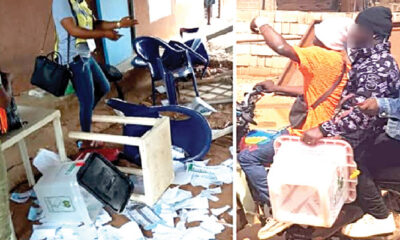Business
Amid Rising Debt, Subsidy Cost Jumps By 370%
Published
2 years agoon
By
Editor
The cost of fuel subsidy is estimated to increase by 369.93 per cent from 2021 to 2023, according to The PUNCH.
In 2021, the Nigerian National Petroleum Corporation said fuel subsidy gulped N1.43tn, although there was no record for under-recovery in January.
The Minister of Finance, Budget and National Planning, Zainab Ahmed, had said on Thursday at the presentation of the 2023-2035 Medium Term Expenditure Framework & Fiscal Strategy Paper in Abuja that the Federal Government had projected to spend N6.72tn on petrol subsidy payments in 2023.
However, Ahmed said subsidy payment projection was based on two scenarios, with the first being spending an estimated N6.72tn for the entire year and the second, removing subsidy by June 2023 with the government spending N3.36tn rather than the full estimated N6.72tn.
READ ALSO: Debt Servicing May Take All Of Nigeria’s Revenue By 2026, IMF Warns
She further noted that both scenarios had implications for net accretion to the federation account and projected deficit levels.
In January this year, the Federal Government decided to retain the controversial fuel subsidy for another 18 months following threats of protests by the Nigerian Labour Congress and other interest groups.
The International Monetary Fund recently said the fear of political resistance, widespread corruption and pressure from interested groups were hampering the removal of the fuel subsidy in Nigeria.
In the first five months, Nigeria spent N1.27tn on petrol subsidy, with a plan to spend N4tn this year.
It was also disclosed that Nigerian National Petroleum Company Limited would continue to fund the N4.19tn fuel subsidies for the 2022 fiscal year on behalf of the federation despite being a commercial venture and its stance of no longer remitting any money to the Federation Accounts Allocation Committee for sharing to the three tiers of government monthly.
The increasing cost of fuel subsidy is projected to persist amid declining revenues and rising debts.
According to a recent report, the FAAC allocation to the federal, state and local governments declined to 2.18tn between January and March 2022 when compared to the N2.24tn disbursed in the preceding quarter, Q4 2021.
The Debt Management Office recently disclosed that Nigeria’s total public debt stock increased to N41.60tn in the first quarter of 2022 from N39.56tn as of December 2021, showing an increase of N2.04tn within a period of three months.
During the presentation of the MTEF and FSP paper, the finance minister disclosed that the cost of servicing debt surpassed the Federal Government’s retained revenue by N310bn in the first four months of 2022..
It was disclosed the Federal Government’s total revenue for the period was N1.63tn, while debt service gulped N1.94tn.
The IMF has also said that Nigeria will likely depend on overdrafts from the Central Bank of Nigeria to fund its proposed petrol subsidy bill.
READ ALSO: Nigeria’s Debt Set To Hit N45trn As Plan To Borrow Additional N6.39trn Emerges
The finance minister has also said that Federal Government was planning to tap €2bn ($2.2bn) of the money it raised in a Eurobond sale last year and targets more local borrowing in 2022 to help fund fuel subsidy.
The World Bank recently warned that increasing fuel subsidy puts the Nigerian economy at a high risk as subsidy payments could significantly impact public finance and pose debt sustainability concerns.
You may like


Fuel Subsidy Removal Cripples 90% Of Nigerian Businesses – Report


Fuel Subsidy: Afe Babalola Varsity Increases Staff Gross Salaries By 35%


Petrol Stations Shutting Down, Marketers Warn


JUST IN: FG Gives ₦5bn Subsidy Palliative To Each State, FCT


Use Money Saved From Subsidy Removal To Fund Education, UK Govt Tells Tinubu


Subsidy Removal: Nigeria On Brink Of Collapse — Catholic Bishops

The Central Bank of Nigeria (CBN) started fresh and direct sales of US dollars at N1,021 per dollar to Bureau De Change operators.
Nigeria’s apex bank disclosed this in a circular signed by its Director of Trade and Exchange Department Hassan Mahmud.
“We write to inform you of the sale of $10,000 by the Central Bank of Nigeria (CBN) to BDCs at the rate of N1,021/$1. The BDCs are in turn to sell to eligible end users at a spread of NOT MORE THAN 1.5 percent above the purchase price,” the circular posted on its website read.
READ ALSO: Tinubu Unveils African Counter-Terrorism Summit
“ALL eligible BDCs are therefore directed to commence payment of the Naira deposit to the underlisted CBN Naira Deposit Account Numbers from today, Monday, April 22, 2024, and submit confirmation of payment, with other necessary documentations, for disbursement of FX at the respective CBN Branches.”
CBN’s move is coming as the naira is recording a slight depreciation against the dollar after weeks of gains.
In late March, the bank also sold $10,000 to each of the eligible Bureau De Change (BDC) operators in the country at the rate of N1,251/$1.
READ ALSO: Mixed Reactions Trail Video Of Couple’s Customised N200 Notes
Like in the most recent sales, it warned BDCs against breaching terms of the dollar sales, vowing to sanction defaulters “including outright suspension from further participation in the sale”.
The fortunes of the naira have fallen sharply since President Bola Tinubu took over in May. Inflation figures have reached new highs and the cost of living hitting the rooftops.
Nigeria’s currency slid to about N1,900/$ some months ago at the parallel market. But in recent weeks, it has gained against the dollar.
The Nigerian authorities have also doubled down on their crackdown against cryptocurrency platform Binance and illegal BDCs.
On March 1, the CBN revoked the licences of 4,173 BDCs over compliance failures.

Olusegun Alebiosu has been appointed as the Acting Managing Director/Chief Executive Officer of First Bank of Nigeria Limited (FirstBank Group), effective April 2024.
Alebiosu steps into this pivotal role from his previous position as the Executive Director, Chief Risk Officer, and Executive Compliance Officer, a position he held since January 2022.
Alebiosu brings to the helm of FirstBank over 28 years of extensive experience in the banking and financial services industry. His expertise spans various domains including credit risk management, financial planning and control, corporate and commercial banking, agriculture financing, oil and gas, transportation, and project financing.
READ ALSO: JUST IN: Access Holdings Names New Acting CEO
Having embarked on his professional journey in 1991 with Oceanic Bank Plc. (now EcoBank Plc.), Alebiosu has held several notable positions in esteemed financial institutions.
Prior to joining FirstBank in 2016, he served as Chief Risk Officer at Coronation Merchant Bank Limited, Chief Credit Risk Officer at the African Development Bank Group, and Group Head of Credit Policy & Deputy Chief Credit Risk Officer at United Bank for Africa Plc.
Alebiosu’s academic credentials further enrich his professional profile. He is an alumnus of the Harvard School of Government and holds a Bachelor’s degree in Industrial Relations and Personnel Management. Additionally, he obtained a Master’s degree in International Law and Diplomacy from the University of Lagos, as well as a Master’s degree in Development Studies from the London School of Economics and Political Science.
READ ALSO: Meet Newly Appointed Union Bank CEO
A distinguished member of various professional bodies, including the Institute of Chartered Accountants (FCA), Nigeria Institute of Management (ANIM), and Chartered Institute of Bankers of Nigeria (CIBN), Alebiosu is renowned for his commitment to excellence and ethical practices in the banking sector.
Beyond his professional endeavors, Alebiosu is known for his passion for golf and adventure. He is happily married and a proud parent.
With Alebiosu’s appointment, FirstBank of Nigeria Limited anticipates continued growth and innovation under his leadership, reinforcing its position as a leading financial institution in Nigeria and beyond.
Business
CBN Gives New Directive On Lending In Real Estate
Published
1 week agoon
April 17, 2024By
Editor
The Central Bank of Nigeria, CBN, has released a new regulatory directive to enhance lending to the real sector of the Nigerian economy.
The directive, issued on April 17, 2024, with reference number BSD/DIR/PUB/LAB/017/005 and signed by the Acting Director of Banking Supervision, Adetona Adedeji, signifies a notable shift in the bank’s policy towards a more contractionary approach.
In line with the new measures, the CBN has reduced the loan-to-deposit ratio by 15 percentage points, down to 50 per cent.
This move aligns with the CBN’s current monetary tightening policies and reflects the increase in the Cash Reserve ratio rate for banks.
READ ALSO: JUST IN: CBN Gov Sacks Eight Directors, 32 Others
The LDR is a metric used to evaluate a bank’s liquidity by comparing its total loans to its total deposits over the same period, expressed as a percentage.
An excessively high ratio may indicate insufficient liquidity to meet unexpected fund requirements.
All Deposit Money Banks are now mandated to adhere to this revised LDR.
The CBN has stated that average daily figures will be utilised to gauge compliance with this directive.
Furthermore, while DMBs are encouraged to maintain robust risk management practices in their lending activities, the CBN has committed to continuous monitoring of adherence and will adjust the LDR as necessary based on market developments.
READ ALSO: JUST IN: CBN Increases Interest Rate To 24.75%
Adedeji has called on all banks to acknowledge these modifications and adjust their operations accordingly. He emphasised that this regulatory adjustment is anticipated to significantly influence the banking sector and the wider Nigerian economy.
The circular read in part, “Following a shift in the Bank’s policy stance towards a more contractionary approach, it is crucial to revise the loan-to-deposit ratio policy to conform with the CBN’s ongoing monetary tightening.
“Consequently, the CBN has decided to decrease the LDR by 15 percentage points to 50 per cent, proportionate to the rise in the CRR rate for banks.
“All DMBs must maintain this level, and it is advised that average daily figures will still be applied for compliance assessment.
“While DMBs are urged to sustain strong risk management practices concerning their lending operations, the CBN will persist in monitoring compliance, reviewing market developments, and making necessary adjustments to the LDR. Please be guided accordingly.”

Kanye West To Launch Yeezy P0rn Studio With Stormy Daniels

Software Engineer Sentenced To Life In Prison For R*ping Neighbour’s Daughter

Many Ladies Can’t Cook, Christian Movie Producer, Bamiloye Laments Scarcity Of ‘Wife Materials’
Trending

 Entertainment2 days ago
Entertainment2 days agoBridesmaids’ Dance At Wedding Causes Stir On Social Media [VIDEO/PHOTOS]

 Politics3 days ago
Politics3 days agoEdo Guber: Akoko-Edo PDP Leaders Meet In Igara, Describe Ighodalo, Ogie As ‘Perfect Match’

 News4 days ago
News4 days agoFoundation Advocates Empowerment Of Women, Youth In Nigeria

 Metro2 days ago
Metro2 days agoVIDEO: ‘UNN Lecturer’ Caught Pants Down With Married Student

 News3 days ago
News3 days agoOutrage As Chinese Supermarket In Abuja Denies Nigerians Entry

 News4 days ago
News4 days agoJapa: Types Of US Visa Available To Nigerians, Other Foreigners

 News5 days ago
News5 days agoWhy Police Detained Yahaya Bello’s ADC, Security Details Revelead

 News2 days ago
News2 days agoIGP, Jonathan Disagree Over State Police

 News5 days ago
News5 days agoJUST IN: Ondo Poll: Violence Breaks Out At APC Primary In Okitipupa

 News5 days ago
News5 days agoDelta Bloodbath: Oborevwori Assures Okuama indegenes Of Safe Return As He Visits Troubled Community

































